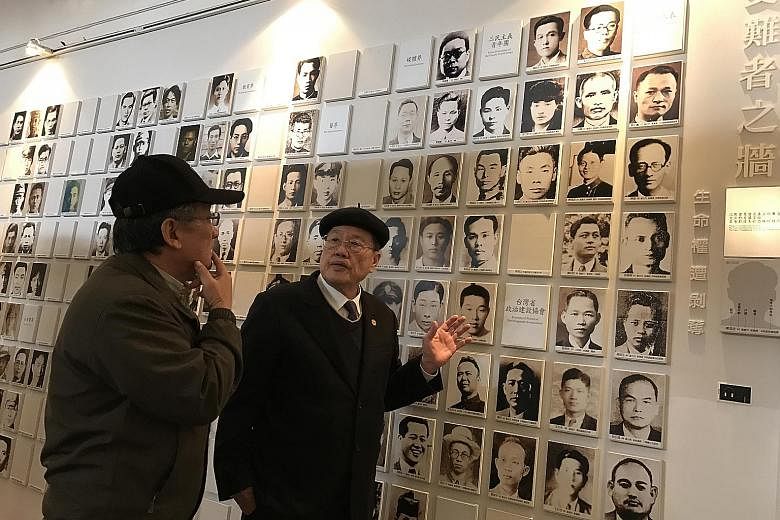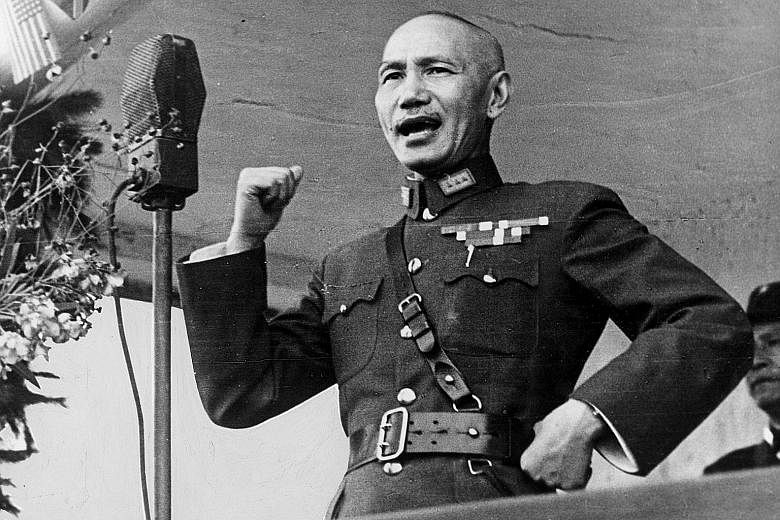For more than 40 years, Mr Pan Hsin-hsing had been unable to shake off the feeling that society turned its back on him and his eight siblings after their father was executed for being part of an anti-government uprising in 1947.
Although his father was a doctor and popular politician in Chiayi city, Mr Pan was branded a "thug's son". He never knew why and could never talk - much less learn more - about the Feb 28 government crackdown, commonly known in Taiwan as the 2/28 Incident.
"I felt so inferior and ashamed. When I asked my mum and siblings why people were calling me and my father names, they either exchanged glances and walked away or told me there was nothing to say," said Mr Pan, 77, who also lost his 15-year-old brother, believed to have been shot after going out to look for their father.
It was not until 1990 that Mr Pan, then 50, learnt that his father was deemed a critic of the Kuomintang (KMT) and its leader Chiang Kai- shek and killed by a firing squad, alongside other local politicians.
-
The 2/28 Incident
-
1947
Feb 27: Tobacco Monopoly Bureau enforcement agents in Taipei hit a woman on the head with a pistol while confiscating contraband cigarettes. A large crowd confronts the agents, prompting one agent to open fire and kill one person.
Feb 28: Mass protests, targeting government officials and mainlanders, break out, forcing soldiers to open fire and kill people in what is commonly known as 2/28 Incident.
March 8: Troops under General Chiang Kai-shek crush the Taiwan unrest. Up to 30,000 believed killed in the White Terror Era.
1949
Mao Zedong leads communists to victory in China, chasing out the Kuomintang government. Gen Chiang moves his government to Taiwan and enforces martial law.
1975
Gen Chiang dies and his son Chiang Ching-kuo becomes President.
1987
President Chiang Ching-kuo abolishes martial law, allowing family visits to the mainland although some restrictions like limited freedom of assembly still in place.
1988
Mr Chiang dies. His successor, Taiwan-born Lee Teng-hui, relaxes restrictions on dialect and culture.
1995
President Lee apologises for the KMT actions and declares Feb 28 Peace Memorial Day. He also sets up the 228 Memorial Foundation and offers compensation to victims and their families.
2006
President Chen Shui-bian announces that Chiang Kai-shek International Airport be renamed Taoyuan International Airport.
2008
President Ma Ying-jeou apologises for White Terror Era atrocities.
2017
President Tsai Ing-wen vows a thorough probe of the 2/28 Incident while her government looks to rename Chiang Kai-shek Memorial Hall and proposes a Bill to remove Chiang's statues from the hall.
They were among as many as 30,000 killed in a precursor to a wider suppression of political dissidents between 1947 and 1987, dubbed the White Terror Era, when martial law was imposed. Official records show that as many as 140,000 were tried in military courts and up to 8,000 executed.
While open criticism of Chiang was once taboo, Mr Pan is today one of the most vocal in calling for those responsible for the killings to be held accountable.
Speaking at the 70th anniversary of the tragedy late last month, the director-general of the Taiwan 228 Incident Care Association, urged President Tsai Ing-wen, who was also at the memorial, to get to the bottom of the matter.
He is also pushing the government to remove all images and statues of Chiang, who has been identified by a 2006 government-funded report and scholars as the main culprit behind the 2/28 and White Terror purges.
Today, statues of the former dictator still stand in parks and schools, although some have been defaced or destroyed during the 2/28 memorial. Last month, four students at Fu Jen Catholic University in New Taipei City tried to decapitate a bronze statue of Chiang with an electric saw, triggering a public outcry.
But what is perhaps the most visible symbol of his iron-fisted rule is the Chiang Kai-shek Memorial Hall. The blue-and-white building in Taipei's Zhongzheng district houses a larger-than-life bronze statue of the dictator and a museum showcasing his personal items, limousines and more.
As popular as the hall is among tourists, it is also a source of indignation for those whose families suffered from the regime's atrocities.
"Why are we celebrating his mercilessness? The existence of the memorial hall and statues that idolise him is an insult to us," said Mr Yang Chen-long, 65. Chiang's troop tortured his grandfather and father and drowned his uncle. The chief executive officer of the 228 Memorial Foundation that runs the National 228 Memorial Museum, said Taiwanese in their 20s and 30s are also pitching in and spreading the word by holding concerts and seminars.
President Tsai has promised a "rigorous" probe into how the KMT government under Chiang quelled the uprising, adding that reconciliation is built on truth and that Taiwan's democracy is mature enough to discuss the 2/28 Incident. The investigation is expected to take three years.
Ms Tsai's push for transitional justice comes after the National Archives Administration declassified all documents about the tragedy. The government also announced plans to revamp, and possibly rename, the Chiang Kai-shek Memorial Hall and remove statues of him. Besides banning the sale of memorabilia and souvenirs bearing his image, the government will close the memorial hall on Feb 28 every year.
While some have cheered Ms Tsai's measures as bold, others say she and the Democratic Progressive Party (DPP), which ousted the KMT in the polls last year, are merely capitalising on historical injustices for their own political gain at a time when the Taiwanese identity is on the rise and support dwindles for unification with China.
Moreover, some supporters of the KMT, which traces its roots to China, credit Chiang and his son for protecting Taiwan from communism and creating its economic miracle.
KMT leader Hung Hsiu-chu accused Ms Tsai and the DPP government of "laying the political groundwork for Taiwanese independence". The opposition party's Culture and Communications Committee deputy director Hu Wen-chi told The Straits Times: "Of course, we can still do more to ease the pain of the victims and their families but the DPP is trying to erode the KMT's credibility and standing. She should focus on reviving the economy and people's daily needs."
Indeed, a poll by pro-KMT newspaper China Times found 55 per cent of respondents opposed the removal of Chiang-themed souvenirs and closure of the memorial hall on Feb 28.
Historians and observers say the latest moves are timely, though. National Chengchi University's Graduate Institute of Taiwan History director Hsueh Hua-yuan, who is also the 228 Memorial Foundation chairman, said: "We are not whitewashing history. We are re-examining Chiang's status and his deeds so we can get our history right and ensure subsequent generations will learn from this lesson."
For Mr Pan, it is not about exacting "revenge" on the perpetrators but seeking justice.
"We will not forget what happened but, at the very least, we can forgive and move on," he said.


